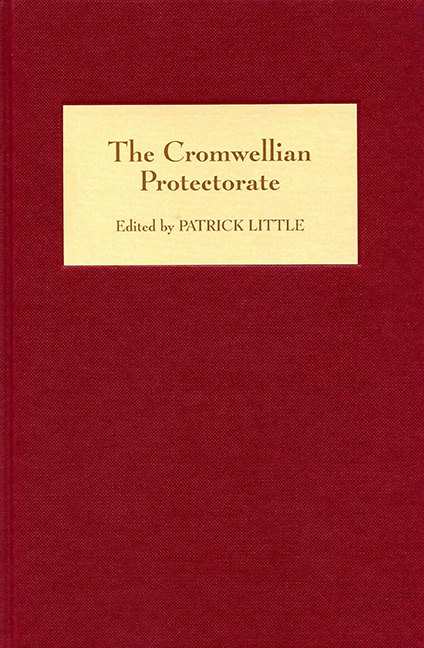7 results

The Cromwellian Protectorate
-
- Published by:
- Boydell & Brewer
- Published online:
- 24 October 2017
- Print publication:
- 18 January 2007
Index
-
- Book:
- The Cromwellian Protectorate
- Published by:
- Boydell & Brewer
- Published online:
- 24 October 2017
- Print publication:
- 18 January 2007, pp 207-218
-
- Chapter
- Export citation
Frontmatter
-
- Book:
- The Cromwellian Protectorate
- Published by:
- Boydell & Brewer
- Published online:
- 24 October 2017
- Print publication:
- 18 January 2007, pp i-iv
-
- Chapter
- Export citation
Contents
-
- Book:
- The Cromwellian Protectorate
- Published by:
- Boydell & Brewer
- Published online:
- 24 October 2017
- Print publication:
- 18 January 2007, pp v-v
-
- Chapter
- Export citation
Notes on Contributors
-
- Book:
- The Cromwellian Protectorate
- Published by:
- Boydell & Brewer
- Published online:
- 24 October 2017
- Print publication:
- 18 January 2007, pp ix-x
-
- Chapter
- Export citation
Abbreviations
-
- Book:
- The Cromwellian Protectorate
- Published by:
- Boydell & Brewer
- Published online:
- 24 October 2017
- Print publication:
- 18 January 2007, pp xi-xii
-
- Chapter
- Export citation
List of Illustrations
-
- Book:
- The Cromwellian Protectorate
- Published by:
- Boydell & Brewer
- Published online:
- 24 October 2017
- Print publication:
- 18 January 2007, pp vi-vi
-
- Chapter
- Export citation



